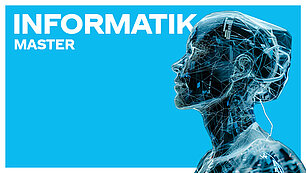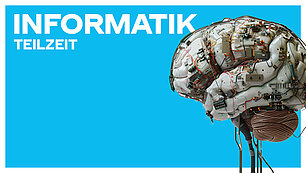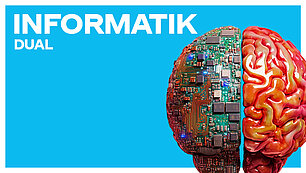
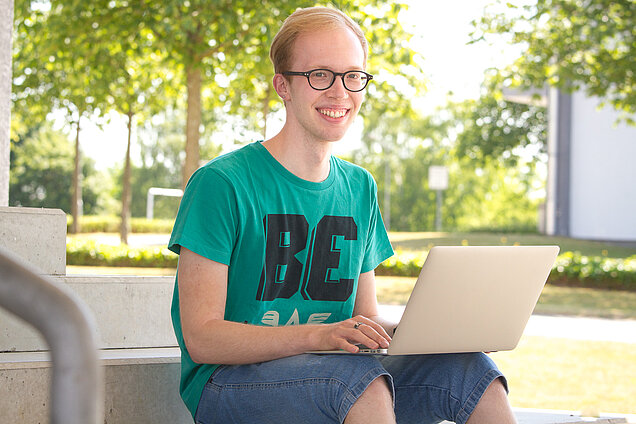

Combine professional activity with a degree programme to obtain your Master's degree
Master Computer Science Dual
Dual study is the ideal combination of theory and practice!
Study the practice-integrated dual English-language Master's degree programme in Computer Science.
Computer science lives through its practical application. As a student on a Bachelor's degree programme, you will certainly be aware of this. Perhaps you have worked in a company or even written your Bachelor's thesis there. You can continue on this path with our dual Master's degree programme in Computer Science.
For prospective students from abroad, it is important to know that the English-language Computer Science dual degree program can only be studied if you can present an internship/qualification contract with a company based in Germany at the time of enrollment. In this contract, the company must guarantee that the lingua franca of the working group in which you are involved is English. You are responsible for finding a company and concluding the contract yourself. Furthermore, the company must have concluded a valid cooperation agreement with Kaiserslautern University of Applied Sciences. You can find help with choosing a company here. For sample contracts, please contact the head of degree program.
Important note: For technical reasons, international applicants interested in the Master's degree program Computer Science - dual - English please register for the Master's degree program Informatik. After going through the validation process there, please inform the Registrar's Office of your change request. You can then also submit the required contract documents there.
What characterises the English-language dual Master's degree programme in Computer Science at Kaiserslautern University of Applied Sciences?
On our English-language dual degree programme in Computer Science Master's, you will complete over 50% of your coursework through practical activities in a company with English as the lingua franca. This allows you to apply and deepen the skills you have acquired in your lectures. You will thus achieve a strong link between theory and practice. Last but not least, you will earn your own money during your studies. The courses on the dual English Master's degree programme are also offered in English.
A contract with a company is a prerequisite for enrolment on the dual English-language degree programme. You look for this company yourself. If you do not yet have any contacts, you can use our company database for orientation. As a special requirement, the company you choose must use English as the lingua franca for the part of the programme relevant to you.
You will attend exactly the same compulsory and profile elective courses as students on the normal Computer Science Master's programme. In the area of compulsory electives, you have to earn fewer ECTS points than your fellow students on the regular degree programme. In return, you will contribute activities from your company via the modules Mentor-accompanied practical activity and a project. You can find a detailed description of the modules here (link follows).
At a glance
PO Version
2025
Abschluss
Master of Science
Studiengangsart
Konsekutiver Studiengang, Präsenzstudium
Studienmodell
Praxisintegriert
Campus
Zweibrücken
Fachbereich
Informatik und Mikrosystemtechnik
Regelstudienzeit
3 Semester
Zugangsvoraussetzungen
Abgeschlossener Bachelorstudiengang im Bereich der Informatik mit 210 ECTS (180 ECTS mit auflagen möglich). Details werden in der Fachprüfungsordnung geregelt.
Sprachkenntnisse in Englisch auf mindestens B2-Niveau und in Deutsch auf mindestens B1-Niveau.
Vorpraktikum
Nein
Studienbeginn
Sommersemester und Wintersemester
Lehrsprache
Englisch
Akkreditierung
akkreditiert bis 28.02.2031, Hochschule Kaiserslautern
How does the interaction between the degree programme and the company work?
You coordinate the scope, content and times of your practical work with your chosen company. In addition to the lecture-free period between semesters, we create free time in the timetable that you can use. Within this framework, you will also take the subjects mentor-accompanied practical work and the project (software development or human-technology interaction) in the first and second semesters, each comprising 12 ETCS, which you can also complete at the company during the semester break.
A seminar for dual Master's students takes place once a year. Here you report on your work in the company. In addition to all students, we also invite their supervisors from the companies. This format is very popular, especially with the companies, as it allows us to keep the feedback from practice necessary for teaching up to date.
At the end of your degree programme, you will complete your Master's thesis in your company. Of the 90 ECTS to be earned, you will earn 54 ECTS in your chosen company during your Dual Master's programme.
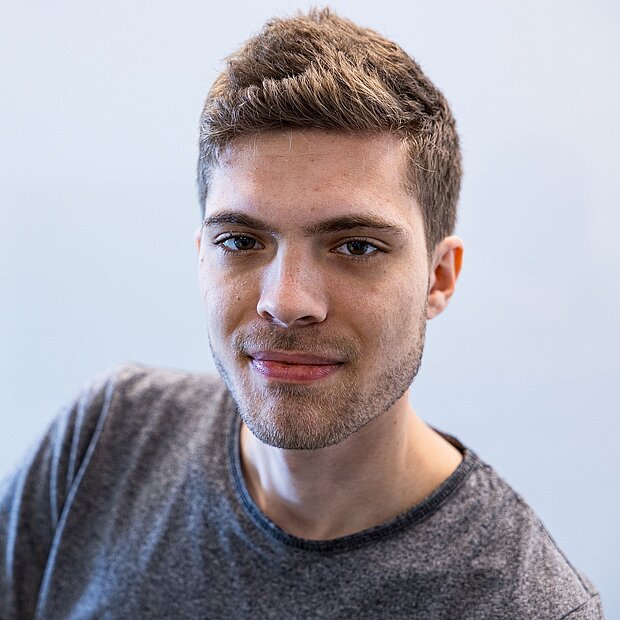
‘The dual Master's programme in computer science allows you to apply the theoretical knowledge you have learned in real projects in the company - you quickly gain an insight into real life in computer science. As a student, you receive detailed, individualised support from professors for the various projects and the Master's thesis.’ (Photo: private)
Student, Henry (translated)
General Information
Have you gained professional experience during or after your Bachelor's degree? Or are you already deepening the skills you have acquired with us in professional practice? Then a dual Computer Science Master's programme could be the right choice for you. You combine the academic education at our university with practical work experience in a company. In this way, you can put your newly acquired knowledge into practice straight away.
The structure and content of the full-time and dual study programmes differ in that the work to be completed in the compulsory elective area is shifted in favour of the work in your chosen company. The duration of the programme does not change. The same profile lines are open to you. You can start your degree programme in the regular summer semester or in the winter semester.
Instead of two cross-profile compulsory electives, you will only take one cross-profile compulsory elective in the first semester and already earn 6 ECTS credits in the company via the mentor-accompanied practical work module. This module continues in the second semester, in which you do not have to take any further cross-profile compulsory electives. The dual study programme is therefore characterised by a stronger focus on your future work in the company.
The degree programme
In the first two semesters, challenging courses deepen and broaden your specialist knowledge.
In addition to the compulsory subjects and the profile subjects of your chosen specialisation, you will take two compulsory electives. One from your specific specialisation and one cross-profile module. In contrast to the regular full-time or part-time degree programme, you will start your qualification in the first semester with the mentor-supported practical activity module in your chosen company and continue this in the second semester. This provides two times 6 ECTS towards your Master's qualification.
Depending on the chosen profile line, this is supplemented by the 12 ECTS Software Development or Human-Technology Interaction project in the second semester. The difference between mentor-accompanied practical work and the projects lies in the amount of supervision provided by the university during your work.
The dual study programme concludes in the third semester when you finally write your Master's thesis (30 ECTS) in your training company.
The main difference to the regular degree programmes is that you are tied to the company of your choice for the three modules Mentor-accompanied practical activity, Project and Master's thesis, which gives you a high degree of continuity in terms of content, whereas students on the regular degree programmes can / must choose a company again or complete their work at the university.
You can find details on the study programme in the examination regulations.
Admission to the Master's degree program is granted to students who have a first professionally qualifying degree with a good final grade in a computer science degree program. Further details can be found in the subject examination regulations.
If your Bachelor's degree has 210 ECTS points, your standard period of study is 3 semesters, as specified in the study plan
If you have completed your Bachelor's degree in 6 semesters, i.e. you only start with 180 ECTS credits, you will need to complete a further 30 ECTS credits in the Master's degree. You can achieve this through a selection of cross-profile compulsory electives. You will then study for 4 semesters. It is not possible to choose the mobility module or the mentor-accompanied practical activity module in the dual Master's degree program.
If you have already acquired professional qualifications, it may be possible to have these recognized up to the 30 ECTS credits required. The best way to do this is to contact the head of degree program for the Master's in Computer Science.
In addition, a contract with the company for participation in a dual Master's degree program must be submitted when enrolling for the dual Master's degree program in Computer Science. This contract must ensure that the language of communication in the company is English for the English-language dual study program variant. You can find more information about companies here.
To apply for the English-language dual Master's degree program in Computer Science, you must provide proof of German language skills at least at level B1 according to the Common European Framework of Reference for Languages (CEFR) if your native language is not German or you have not obtained your Bachelor's degree in a German-language degree program.
If your native language is not English or you have not obtained your Bachelor's degree in an English-language degree program, you must provide proof of English language proficiency of at least level B2 according to the Common European Framework of Reference for Languages (CEFR) in order to apply for the English-language dual Master's degree program in Computer Science.
As proof of language proficiency, applicants must submit a certificate from a recognized language test, which must not be older than 24 months.
As an applicant with a 180 ECTS Bachelor's degree, you can also aim for a reduced Master's degree with 270 ECTS as an alternative to the additional 30 ECTS mentioned above, although this does not qualify you for a higher career in the civil service.
If the collaboration with your chosen company no longer proves feasible for whatever reason, it is possible to switch to the regular full-time Master's degree programme. Achievements will be recognised on an individual basis. However, if you are a native English speaker without a previous degree from a German-language degree programme, you must ensure that your German language level can be proven to be B1 at the time of transfer.
Complex software projects are a challenge. Technical aspects challenge us. No project without the human factor - customers and users take centre stage. We prepare you for the next challenges. You will learn how to integrate data science and machine learning into products in a meaningful way and how you can use them to increase your productivity in your professional life.
In the Machine Learning and Software Engineering profile line, in addition to the basic subjects of Automata, Computability and Complexity and Advanced Software Engineering, you will take the following subjects
- Project Software Development
- Social Skills
- Machine Learning and
- Data Science
In the software development project, you will work in a team on a complex topic in software engineering.
Depending on your profile, you will take at least two of the profile electives:
- Deep Learning,
- IT management,
- Secure Software Engineering,
- Advanced Robotics,
- AI-supported image analysis,
- software quality management.
How will we interact with technology in the future? Will we control the technology, or will the technology control us? We need to be able to design and implement outstanding interfaces.
In the Human Computer Interaction profile line, in addition to the basic subjects of Automata, Computability and Complexity and Advanced Software Engineering, you will take the following subjects
- Project Human-Technology Interaction,
- Social Skills,
- Framework-based UI development and
- interaction design.
In the Human-Technology Interaction project, you will work in a team on a complex task relating to user interfaces.
Depending on your profile, you will take at least two of the profile electives:
- Advanced Interactive Systems,
- Market and advertising psychology,
- Automotive User Interfaces,
- Methodology of empirical research
Computer science is international! Studying on a dual degree programme ties you to a company in a special way. Stays abroad are also possible as part of this commitment. However, this should not jeopardise your participation in the courses. Preferably, you should therefore arrange this in consultation with your company during the semester break. The choice of mobility module for full-time and part-time degree programmes is not provided for in the dual study programmes.
Prof. Dr Thomas Allweyer and Prof. Dr Uwe Tronnier head of the Master's degree programme in Computer Science, are available as contacts for questions and concerns regarding the dual study programme. The programme director is also responsible for coordination with the companies and the seminars on the modules taking place in the companies.
Each participating company also appoints a supervisor for the dual students.
The contact persons at the university and the companies are in regular contact in order to achieve the best possible integration of university studies and practical work.
Questions about the study program
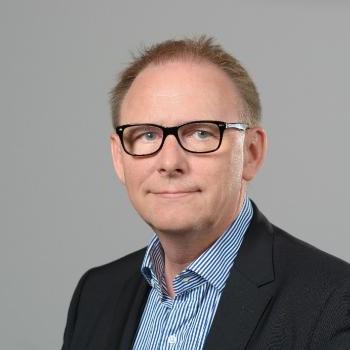
Studiengangsleiter Master Informatik

Prüfungsamt und Studierendensekretariat (ZW)
